Essay: Nursing and Midwifery Board of Australia, HME711, Deakin
VerifiedAdded on 2022/11/09
|11
|3026
|158
Essay
AI Summary
This essay delves into the regulatory framework and ethical considerations governing nursing practice in Australia, focusing on the Nursing and Midwifery Board of Australia (NMBA). It explores legal compliance, including registration standards and mandatory reporting, and emphasizes the importance of lawful and ethical behavior. The essay examines the NMBA's role in ensuring public safety through registration and adherence to a code of conduct, which mandates person-centered care, effective communication, and respect for diverse cultures. It also addresses ethical concerns such as autonomy, beneficence, non-maleficence, and justice, highlighting the significance of professional boundaries, research, and ethical decision-making. Furthermore, the essay discusses challenges faced by nurses, including those related to emergencies, emotional resilience, and retention, while underscoring the importance of continuous professional development and leadership within the profession.
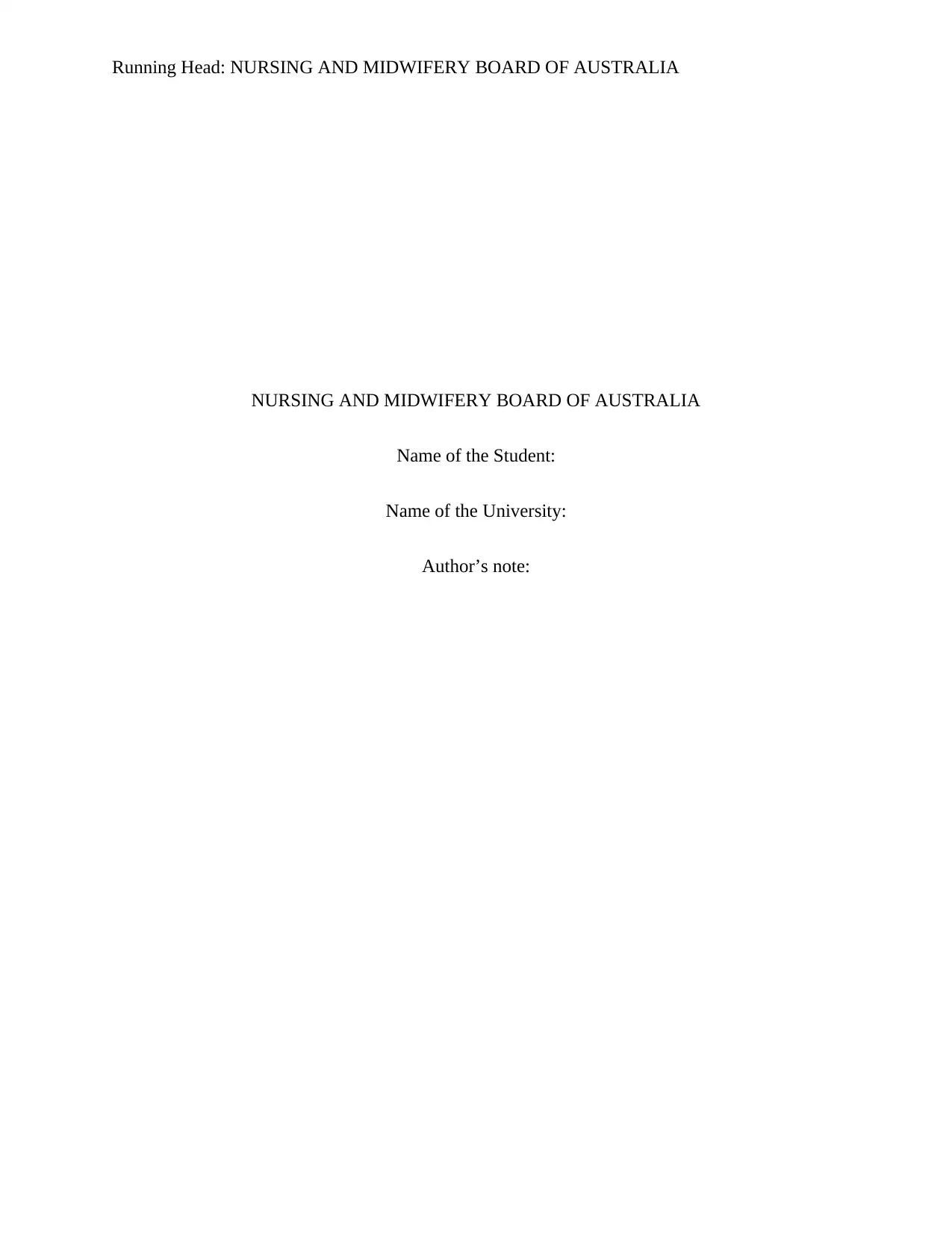
Running Head: NURSING AND MIDWIFERY BOARD OF AUSTRALIA
NURSING AND MIDWIFERY BOARD OF AUSTRALIA
Name of the Student:
Name of the University:
Author’s note:
NURSING AND MIDWIFERY BOARD OF AUSTRALIA
Name of the Student:
Name of the University:
Author’s note:
Paraphrase This Document
Need a fresh take? Get an instant paraphrase of this document with our AI Paraphraser
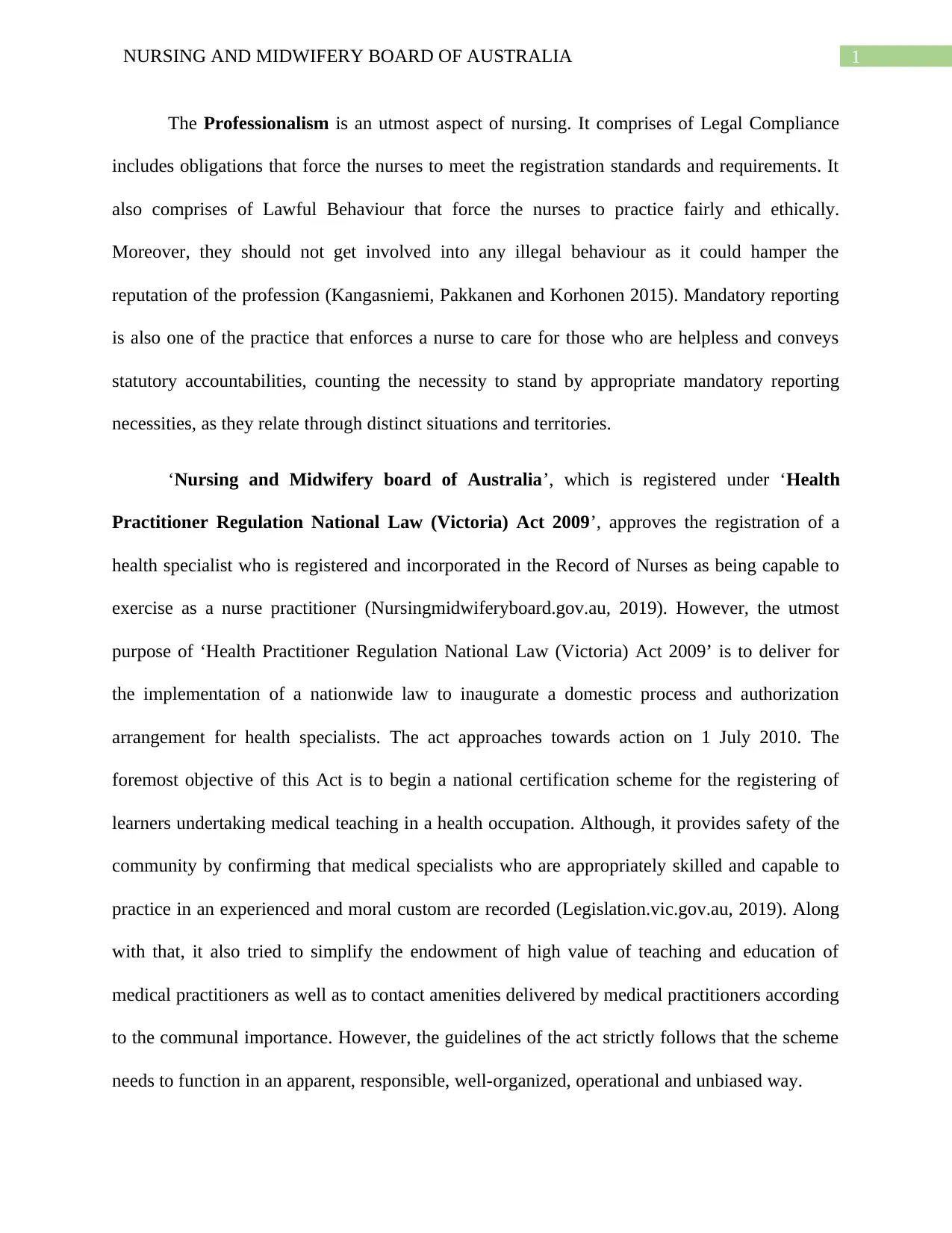
1NURSING AND MIDWIFERY BOARD OF AUSTRALIA
The Professionalism is an utmost aspect of nursing. It comprises of Legal Compliance
includes obligations that force the nurses to meet the registration standards and requirements. It
also comprises of Lawful Behaviour that force the nurses to practice fairly and ethically.
Moreover, they should not get involved into any illegal behaviour as it could hamper the
reputation of the profession (Kangasniemi, Pakkanen and Korhonen 2015). Mandatory reporting
is also one of the practice that enforces a nurse to care for those who are helpless and conveys
statutory accountabilities, counting the necessity to stand by appropriate mandatory reporting
necessities, as they relate through distinct situations and territories.
‘Nursing and Midwifery board of Australia’, which is registered under ‘Health
Practitioner Regulation National Law (Victoria) Act 2009’, approves the registration of a
health specialist who is registered and incorporated in the Record of Nurses as being capable to
exercise as a nurse practitioner (Nursingmidwiferyboard.gov.au, 2019). However, the utmost
purpose of ‘Health Practitioner Regulation National Law (Victoria) Act 2009’ is to deliver for
the implementation of a nationwide law to inaugurate a domestic process and authorization
arrangement for health specialists. The act approaches towards action on 1 July 2010. The
foremost objective of this Act is to begin a national certification scheme for the registering of
learners undertaking medical teaching in a health occupation. Although, it provides safety of the
community by confirming that medical specialists who are appropriately skilled and capable to
practice in an experienced and moral custom are recorded (Legislation.vic.gov.au, 2019). Along
with that, it also tried to simplify the endowment of high value of teaching and education of
medical practitioners as well as to contact amenities delivered by medical practitioners according
to the communal importance. However, the guidelines of the act strictly follows that the scheme
needs to function in an apparent, responsible, well-organized, operational and unbiased way.
The Professionalism is an utmost aspect of nursing. It comprises of Legal Compliance
includes obligations that force the nurses to meet the registration standards and requirements. It
also comprises of Lawful Behaviour that force the nurses to practice fairly and ethically.
Moreover, they should not get involved into any illegal behaviour as it could hamper the
reputation of the profession (Kangasniemi, Pakkanen and Korhonen 2015). Mandatory reporting
is also one of the practice that enforces a nurse to care for those who are helpless and conveys
statutory accountabilities, counting the necessity to stand by appropriate mandatory reporting
necessities, as they relate through distinct situations and territories.
‘Nursing and Midwifery board of Australia’, which is registered under ‘Health
Practitioner Regulation National Law (Victoria) Act 2009’, approves the registration of a
health specialist who is registered and incorporated in the Record of Nurses as being capable to
exercise as a nurse practitioner (Nursingmidwiferyboard.gov.au, 2019). However, the utmost
purpose of ‘Health Practitioner Regulation National Law (Victoria) Act 2009’ is to deliver for
the implementation of a nationwide law to inaugurate a domestic process and authorization
arrangement for health specialists. The act approaches towards action on 1 July 2010. The
foremost objective of this Act is to begin a national certification scheme for the registering of
learners undertaking medical teaching in a health occupation. Although, it provides safety of the
community by confirming that medical specialists who are appropriately skilled and capable to
practice in an experienced and moral custom are recorded (Legislation.vic.gov.au, 2019). Along
with that, it also tried to simplify the endowment of high value of teaching and education of
medical practitioners as well as to contact amenities delivered by medical practitioners according
to the communal importance. However, the guidelines of the act strictly follows that the scheme
needs to function in an apparent, responsible, well-organized, operational and unbiased way.
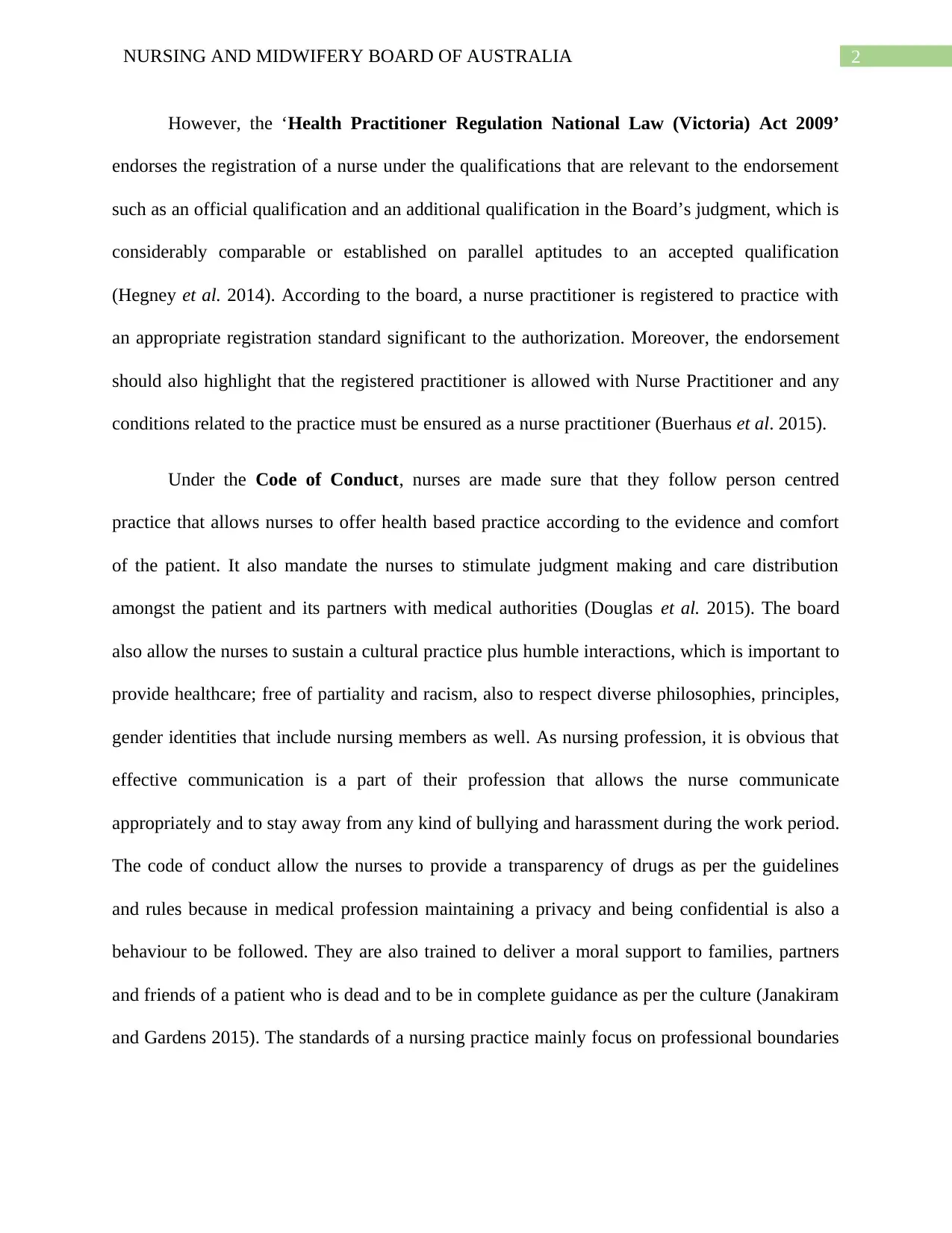
2NURSING AND MIDWIFERY BOARD OF AUSTRALIA
However, the ‘Health Practitioner Regulation National Law (Victoria) Act 2009’
endorses the registration of a nurse under the qualifications that are relevant to the endorsement
such as an official qualification and an additional qualification in the Board’s judgment, which is
considerably comparable or established on parallel aptitudes to an accepted qualification
(Hegney et al. 2014). According to the board, a nurse practitioner is registered to practice with
an appropriate registration standard significant to the authorization. Moreover, the endorsement
should also highlight that the registered practitioner is allowed with Nurse Practitioner and any
conditions related to the practice must be ensured as a nurse practitioner (Buerhaus et al. 2015).
Under the Code of Conduct, nurses are made sure that they follow person centred
practice that allows nurses to offer health based practice according to the evidence and comfort
of the patient. It also mandate the nurses to stimulate judgment making and care distribution
amongst the patient and its partners with medical authorities (Douglas et al. 2015). The board
also allow the nurses to sustain a cultural practice plus humble interactions, which is important to
provide healthcare; free of partiality and racism, also to respect diverse philosophies, principles,
gender identities that include nursing members as well. As nursing profession, it is obvious that
effective communication is a part of their profession that allows the nurse communicate
appropriately and to stay away from any kind of bullying and harassment during the work period.
The code of conduct allow the nurses to provide a transparency of drugs as per the guidelines
and rules because in medical profession maintaining a privacy and being confidential is also a
behaviour to be followed. They are also trained to deliver a moral support to families, partners
and friends of a patient who is dead and to be in complete guidance as per the culture (Janakiram
and Gardens 2015). The standards of a nursing practice mainly focus on professional boundaries
However, the ‘Health Practitioner Regulation National Law (Victoria) Act 2009’
endorses the registration of a nurse under the qualifications that are relevant to the endorsement
such as an official qualification and an additional qualification in the Board’s judgment, which is
considerably comparable or established on parallel aptitudes to an accepted qualification
(Hegney et al. 2014). According to the board, a nurse practitioner is registered to practice with
an appropriate registration standard significant to the authorization. Moreover, the endorsement
should also highlight that the registered practitioner is allowed with Nurse Practitioner and any
conditions related to the practice must be ensured as a nurse practitioner (Buerhaus et al. 2015).
Under the Code of Conduct, nurses are made sure that they follow person centred
practice that allows nurses to offer health based practice according to the evidence and comfort
of the patient. It also mandate the nurses to stimulate judgment making and care distribution
amongst the patient and its partners with medical authorities (Douglas et al. 2015). The board
also allow the nurses to sustain a cultural practice plus humble interactions, which is important to
provide healthcare; free of partiality and racism, also to respect diverse philosophies, principles,
gender identities that include nursing members as well. As nursing profession, it is obvious that
effective communication is a part of their profession that allows the nurse communicate
appropriately and to stay away from any kind of bullying and harassment during the work period.
The code of conduct allow the nurses to provide a transparency of drugs as per the guidelines
and rules because in medical profession maintaining a privacy and being confidential is also a
behaviour to be followed. They are also trained to deliver a moral support to families, partners
and friends of a patient who is dead and to be in complete guidance as per the culture (Janakiram
and Gardens 2015). The standards of a nursing practice mainly focus on professional boundaries
⊘ This is a preview!⊘
Do you want full access?
Subscribe today to unlock all pages.

Trusted by 1+ million students worldwide
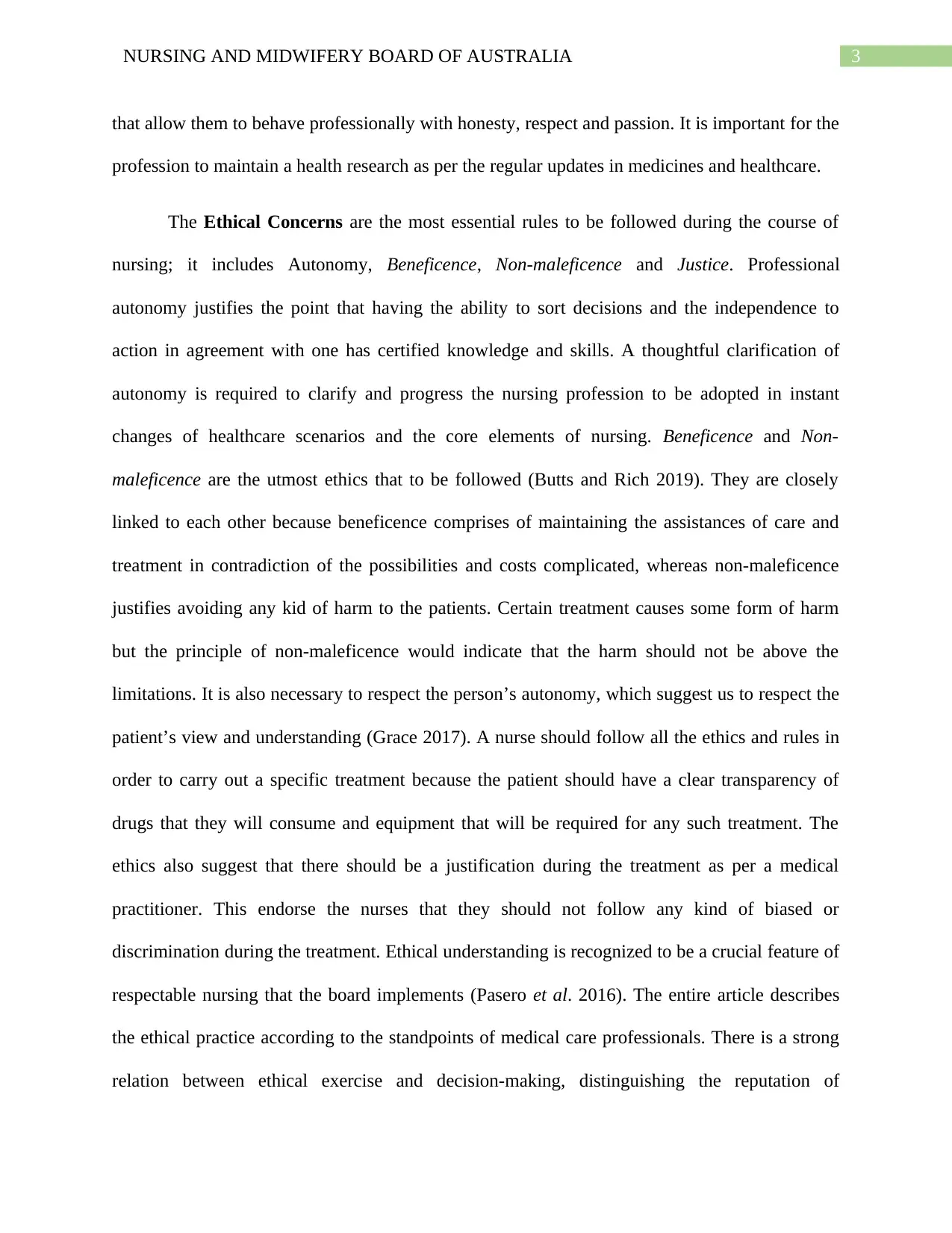
3NURSING AND MIDWIFERY BOARD OF AUSTRALIA
that allow them to behave professionally with honesty, respect and passion. It is important for the
profession to maintain a health research as per the regular updates in medicines and healthcare.
The Ethical Concerns are the most essential rules to be followed during the course of
nursing; it includes Autonomy, Beneficence, Non-maleficence and Justice. Professional
autonomy justifies the point that having the ability to sort decisions and the independence to
action in agreement with one has certified knowledge and skills. A thoughtful clarification of
autonomy is required to clarify and progress the nursing profession to be adopted in instant
changes of healthcare scenarios and the core elements of nursing. Beneficence and Non-
maleficence are the utmost ethics that to be followed (Butts and Rich 2019). They are closely
linked to each other because beneficence comprises of maintaining the assistances of care and
treatment in contradiction of the possibilities and costs complicated, whereas non-maleficence
justifies avoiding any kid of harm to the patients. Certain treatment causes some form of harm
but the principle of non-maleficence would indicate that the harm should not be above the
limitations. It is also necessary to respect the person’s autonomy, which suggest us to respect the
patient’s view and understanding (Grace 2017). A nurse should follow all the ethics and rules in
order to carry out a specific treatment because the patient should have a clear transparency of
drugs that they will consume and equipment that will be required for any such treatment. The
ethics also suggest that there should be a justification during the treatment as per a medical
practitioner. This endorse the nurses that they should not follow any kind of biased or
discrimination during the treatment. Ethical understanding is recognized to be a crucial feature of
respectable nursing that the board implements (Pasero et al. 2016). The entire article describes
the ethical practice according to the standpoints of medical care professionals. There is a strong
relation between ethical exercise and decision-making, distinguishing the reputation of
that allow them to behave professionally with honesty, respect and passion. It is important for the
profession to maintain a health research as per the regular updates in medicines and healthcare.
The Ethical Concerns are the most essential rules to be followed during the course of
nursing; it includes Autonomy, Beneficence, Non-maleficence and Justice. Professional
autonomy justifies the point that having the ability to sort decisions and the independence to
action in agreement with one has certified knowledge and skills. A thoughtful clarification of
autonomy is required to clarify and progress the nursing profession to be adopted in instant
changes of healthcare scenarios and the core elements of nursing. Beneficence and Non-
maleficence are the utmost ethics that to be followed (Butts and Rich 2019). They are closely
linked to each other because beneficence comprises of maintaining the assistances of care and
treatment in contradiction of the possibilities and costs complicated, whereas non-maleficence
justifies avoiding any kid of harm to the patients. Certain treatment causes some form of harm
but the principle of non-maleficence would indicate that the harm should not be above the
limitations. It is also necessary to respect the person’s autonomy, which suggest us to respect the
patient’s view and understanding (Grace 2017). A nurse should follow all the ethics and rules in
order to carry out a specific treatment because the patient should have a clear transparency of
drugs that they will consume and equipment that will be required for any such treatment. The
ethics also suggest that there should be a justification during the treatment as per a medical
practitioner. This endorse the nurses that they should not follow any kind of biased or
discrimination during the treatment. Ethical understanding is recognized to be a crucial feature of
respectable nursing that the board implements (Pasero et al. 2016). The entire article describes
the ethical practice according to the standpoints of medical care professionals. There is a strong
relation between ethical exercise and decision-making, distinguishing the reputation of
Paraphrase This Document
Need a fresh take? Get an instant paraphrase of this document with our AI Paraphraser
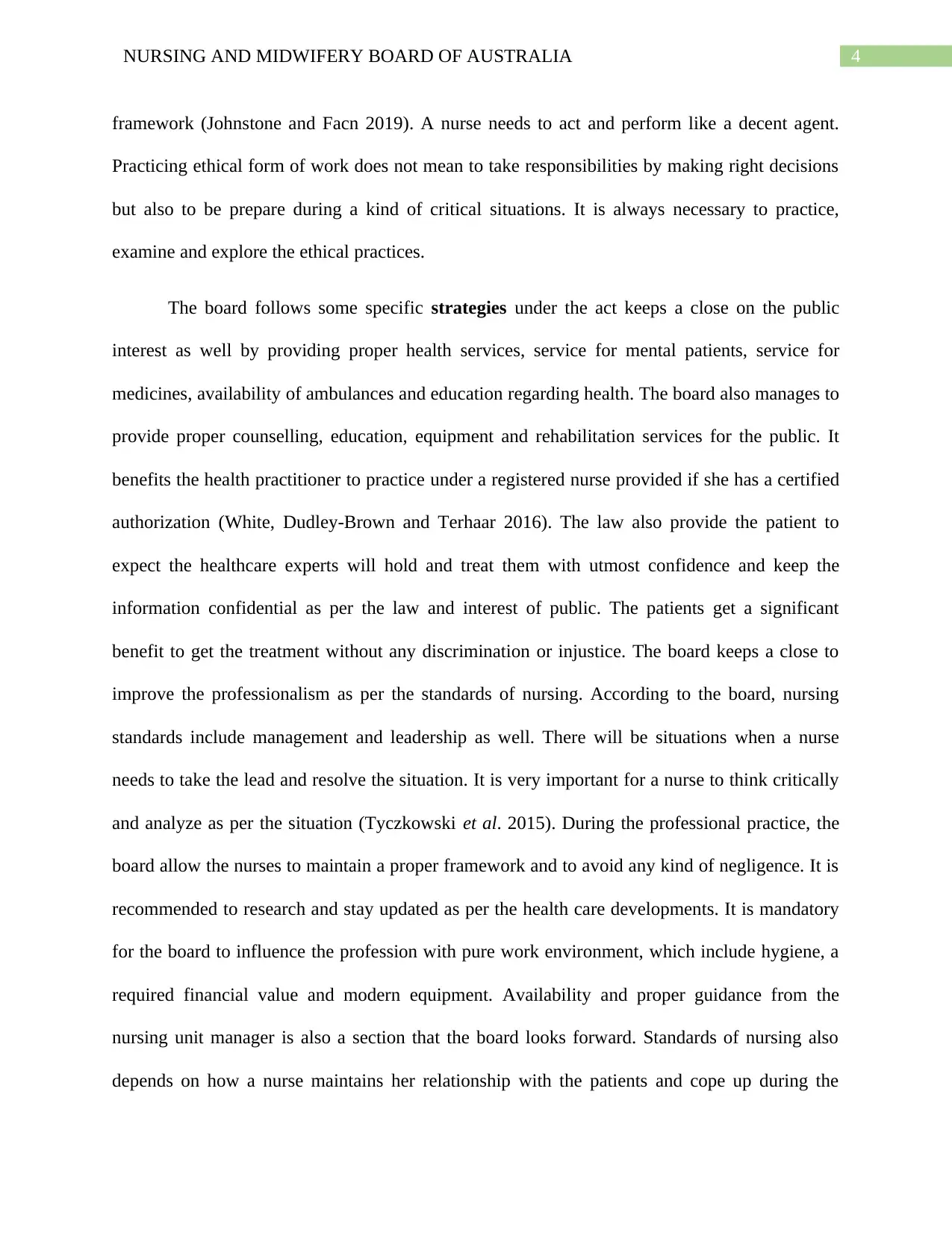
4NURSING AND MIDWIFERY BOARD OF AUSTRALIA
framework (Johnstone and Facn 2019). A nurse needs to act and perform like a decent agent.
Practicing ethical form of work does not mean to take responsibilities by making right decisions
but also to be prepare during a kind of critical situations. It is always necessary to practice,
examine and explore the ethical practices.
The board follows some specific strategies under the act keeps a close on the public
interest as well by providing proper health services, service for mental patients, service for
medicines, availability of ambulances and education regarding health. The board also manages to
provide proper counselling, education, equipment and rehabilitation services for the public. It
benefits the health practitioner to practice under a registered nurse provided if she has a certified
authorization (White, Dudley-Brown and Terhaar 2016). The law also provide the patient to
expect the healthcare experts will hold and treat them with utmost confidence and keep the
information confidential as per the law and interest of public. The patients get a significant
benefit to get the treatment without any discrimination or injustice. The board keeps a close to
improve the professionalism as per the standards of nursing. According to the board, nursing
standards include management and leadership as well. There will be situations when a nurse
needs to take the lead and resolve the situation. It is very important for a nurse to think critically
and analyze as per the situation (Tyczkowski et al. 2015). During the professional practice, the
board allow the nurses to maintain a proper framework and to avoid any kind of negligence. It is
recommended to research and stay updated as per the health care developments. It is mandatory
for the board to influence the profession with pure work environment, which include hygiene, a
required financial value and modern equipment. Availability and proper guidance from the
nursing unit manager is also a section that the board looks forward. Standards of nursing also
depends on how a nurse maintains her relationship with the patients and cope up during the
framework (Johnstone and Facn 2019). A nurse needs to act and perform like a decent agent.
Practicing ethical form of work does not mean to take responsibilities by making right decisions
but also to be prepare during a kind of critical situations. It is always necessary to practice,
examine and explore the ethical practices.
The board follows some specific strategies under the act keeps a close on the public
interest as well by providing proper health services, service for mental patients, service for
medicines, availability of ambulances and education regarding health. The board also manages to
provide proper counselling, education, equipment and rehabilitation services for the public. It
benefits the health practitioner to practice under a registered nurse provided if she has a certified
authorization (White, Dudley-Brown and Terhaar 2016). The law also provide the patient to
expect the healthcare experts will hold and treat them with utmost confidence and keep the
information confidential as per the law and interest of public. The patients get a significant
benefit to get the treatment without any discrimination or injustice. The board keeps a close to
improve the professionalism as per the standards of nursing. According to the board, nursing
standards include management and leadership as well. There will be situations when a nurse
needs to take the lead and resolve the situation. It is very important for a nurse to think critically
and analyze as per the situation (Tyczkowski et al. 2015). During the professional practice, the
board allow the nurses to maintain a proper framework and to avoid any kind of negligence. It is
recommended to research and stay updated as per the health care developments. It is mandatory
for the board to influence the profession with pure work environment, which include hygiene, a
required financial value and modern equipment. Availability and proper guidance from the
nursing unit manager is also a section that the board looks forward. Standards of nursing also
depends on how a nurse maintains her relationship with the patients and cope up during the
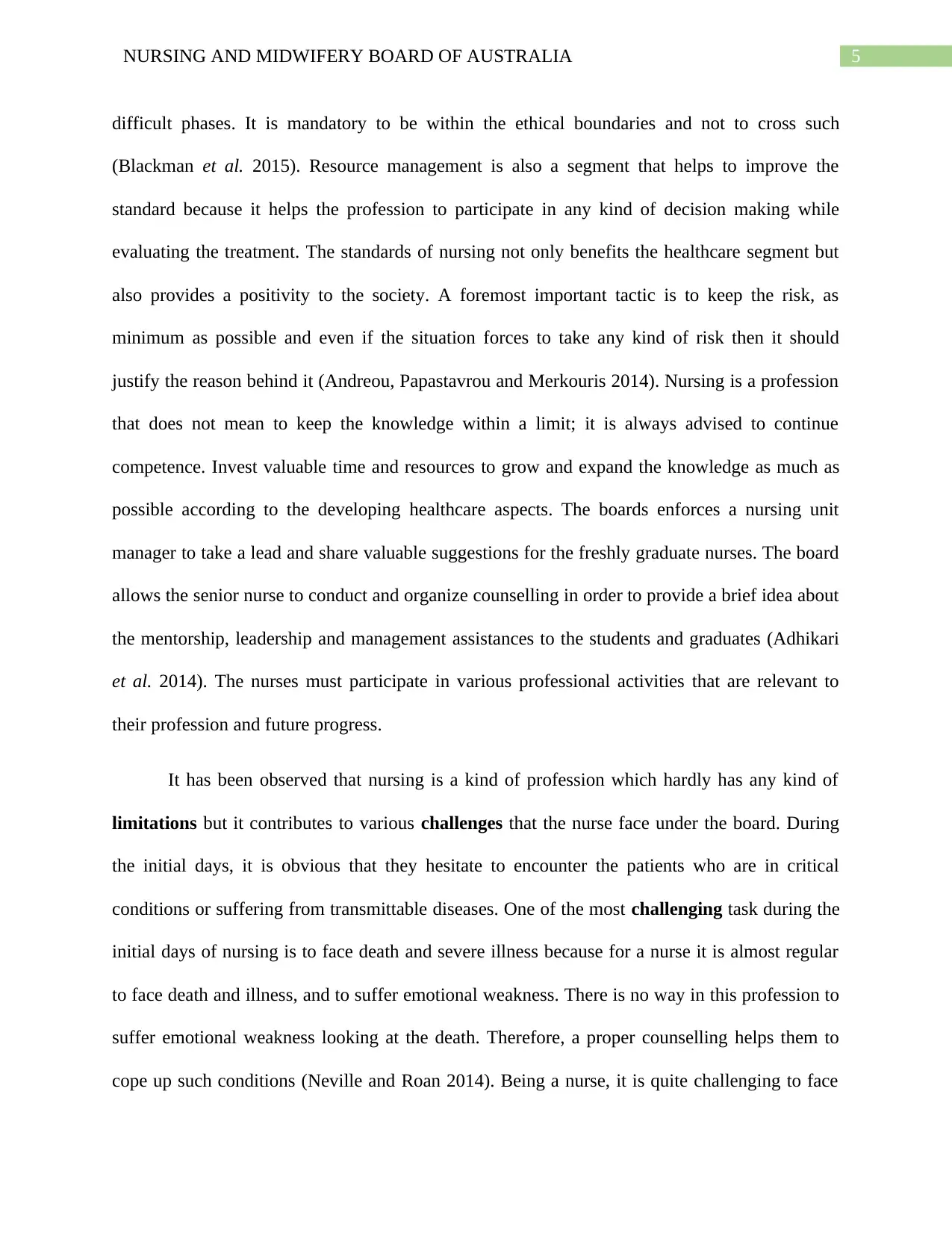
5NURSING AND MIDWIFERY BOARD OF AUSTRALIA
difficult phases. It is mandatory to be within the ethical boundaries and not to cross such
(Blackman et al. 2015). Resource management is also a segment that helps to improve the
standard because it helps the profession to participate in any kind of decision making while
evaluating the treatment. The standards of nursing not only benefits the healthcare segment but
also provides a positivity to the society. A foremost important tactic is to keep the risk, as
minimum as possible and even if the situation forces to take any kind of risk then it should
justify the reason behind it (Andreou, Papastavrou and Merkouris 2014). Nursing is a profession
that does not mean to keep the knowledge within a limit; it is always advised to continue
competence. Invest valuable time and resources to grow and expand the knowledge as much as
possible according to the developing healthcare aspects. The boards enforces a nursing unit
manager to take a lead and share valuable suggestions for the freshly graduate nurses. The board
allows the senior nurse to conduct and organize counselling in order to provide a brief idea about
the mentorship, leadership and management assistances to the students and graduates (Adhikari
et al. 2014). The nurses must participate in various professional activities that are relevant to
their profession and future progress.
It has been observed that nursing is a kind of profession which hardly has any kind of
limitations but it contributes to various challenges that the nurse face under the board. During
the initial days, it is obvious that they hesitate to encounter the patients who are in critical
conditions or suffering from transmittable diseases. One of the most challenging task during the
initial days of nursing is to face death and severe illness because for a nurse it is almost regular
to face death and illness, and to suffer emotional weakness. There is no way in this profession to
suffer emotional weakness looking at the death. Therefore, a proper counselling helps them to
cope up such conditions (Neville and Roan 2014). Being a nurse, it is quite challenging to face
difficult phases. It is mandatory to be within the ethical boundaries and not to cross such
(Blackman et al. 2015). Resource management is also a segment that helps to improve the
standard because it helps the profession to participate in any kind of decision making while
evaluating the treatment. The standards of nursing not only benefits the healthcare segment but
also provides a positivity to the society. A foremost important tactic is to keep the risk, as
minimum as possible and even if the situation forces to take any kind of risk then it should
justify the reason behind it (Andreou, Papastavrou and Merkouris 2014). Nursing is a profession
that does not mean to keep the knowledge within a limit; it is always advised to continue
competence. Invest valuable time and resources to grow and expand the knowledge as much as
possible according to the developing healthcare aspects. The boards enforces a nursing unit
manager to take a lead and share valuable suggestions for the freshly graduate nurses. The board
allows the senior nurse to conduct and organize counselling in order to provide a brief idea about
the mentorship, leadership and management assistances to the students and graduates (Adhikari
et al. 2014). The nurses must participate in various professional activities that are relevant to
their profession and future progress.
It has been observed that nursing is a kind of profession which hardly has any kind of
limitations but it contributes to various challenges that the nurse face under the board. During
the initial days, it is obvious that they hesitate to encounter the patients who are in critical
conditions or suffering from transmittable diseases. One of the most challenging task during the
initial days of nursing is to face death and severe illness because for a nurse it is almost regular
to face death and illness, and to suffer emotional weakness. There is no way in this profession to
suffer emotional weakness looking at the death. Therefore, a proper counselling helps them to
cope up such conditions (Neville and Roan 2014). Being a nurse, it is quite challenging to face
⊘ This is a preview!⊘
Do you want full access?
Subscribe today to unlock all pages.

Trusted by 1+ million students worldwide
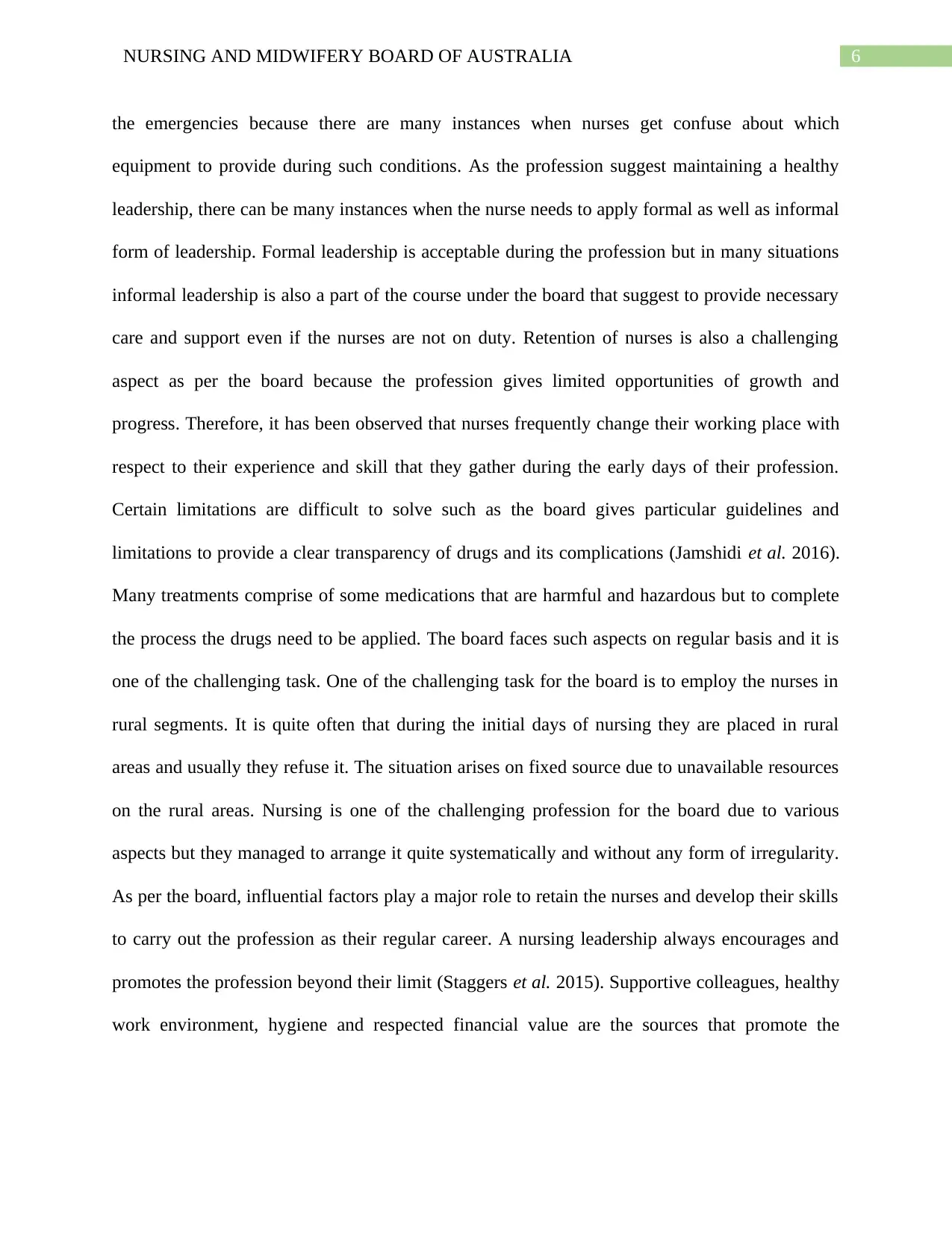
6NURSING AND MIDWIFERY BOARD OF AUSTRALIA
the emergencies because there are many instances when nurses get confuse about which
equipment to provide during such conditions. As the profession suggest maintaining a healthy
leadership, there can be many instances when the nurse needs to apply formal as well as informal
form of leadership. Formal leadership is acceptable during the profession but in many situations
informal leadership is also a part of the course under the board that suggest to provide necessary
care and support even if the nurses are not on duty. Retention of nurses is also a challenging
aspect as per the board because the profession gives limited opportunities of growth and
progress. Therefore, it has been observed that nurses frequently change their working place with
respect to their experience and skill that they gather during the early days of their profession.
Certain limitations are difficult to solve such as the board gives particular guidelines and
limitations to provide a clear transparency of drugs and its complications (Jamshidi et al. 2016).
Many treatments comprise of some medications that are harmful and hazardous but to complete
the process the drugs need to be applied. The board faces such aspects on regular basis and it is
one of the challenging task. One of the challenging task for the board is to employ the nurses in
rural segments. It is quite often that during the initial days of nursing they are placed in rural
areas and usually they refuse it. The situation arises on fixed source due to unavailable resources
on the rural areas. Nursing is one of the challenging profession for the board due to various
aspects but they managed to arrange it quite systematically and without any form of irregularity.
As per the board, influential factors play a major role to retain the nurses and develop their skills
to carry out the profession as their regular career. A nursing leadership always encourages and
promotes the profession beyond their limit (Staggers et al. 2015). Supportive colleagues, healthy
work environment, hygiene and respected financial value are the sources that promote the
the emergencies because there are many instances when nurses get confuse about which
equipment to provide during such conditions. As the profession suggest maintaining a healthy
leadership, there can be many instances when the nurse needs to apply formal as well as informal
form of leadership. Formal leadership is acceptable during the profession but in many situations
informal leadership is also a part of the course under the board that suggest to provide necessary
care and support even if the nurses are not on duty. Retention of nurses is also a challenging
aspect as per the board because the profession gives limited opportunities of growth and
progress. Therefore, it has been observed that nurses frequently change their working place with
respect to their experience and skill that they gather during the early days of their profession.
Certain limitations are difficult to solve such as the board gives particular guidelines and
limitations to provide a clear transparency of drugs and its complications (Jamshidi et al. 2016).
Many treatments comprise of some medications that are harmful and hazardous but to complete
the process the drugs need to be applied. The board faces such aspects on regular basis and it is
one of the challenging task. One of the challenging task for the board is to employ the nurses in
rural segments. It is quite often that during the initial days of nursing they are placed in rural
areas and usually they refuse it. The situation arises on fixed source due to unavailable resources
on the rural areas. Nursing is one of the challenging profession for the board due to various
aspects but they managed to arrange it quite systematically and without any form of irregularity.
As per the board, influential factors play a major role to retain the nurses and develop their skills
to carry out the profession as their regular career. A nursing leadership always encourages and
promotes the profession beyond their limit (Staggers et al. 2015). Supportive colleagues, healthy
work environment, hygiene and respected financial value are the sources that promote the
Paraphrase This Document
Need a fresh take? Get an instant paraphrase of this document with our AI Paraphraser
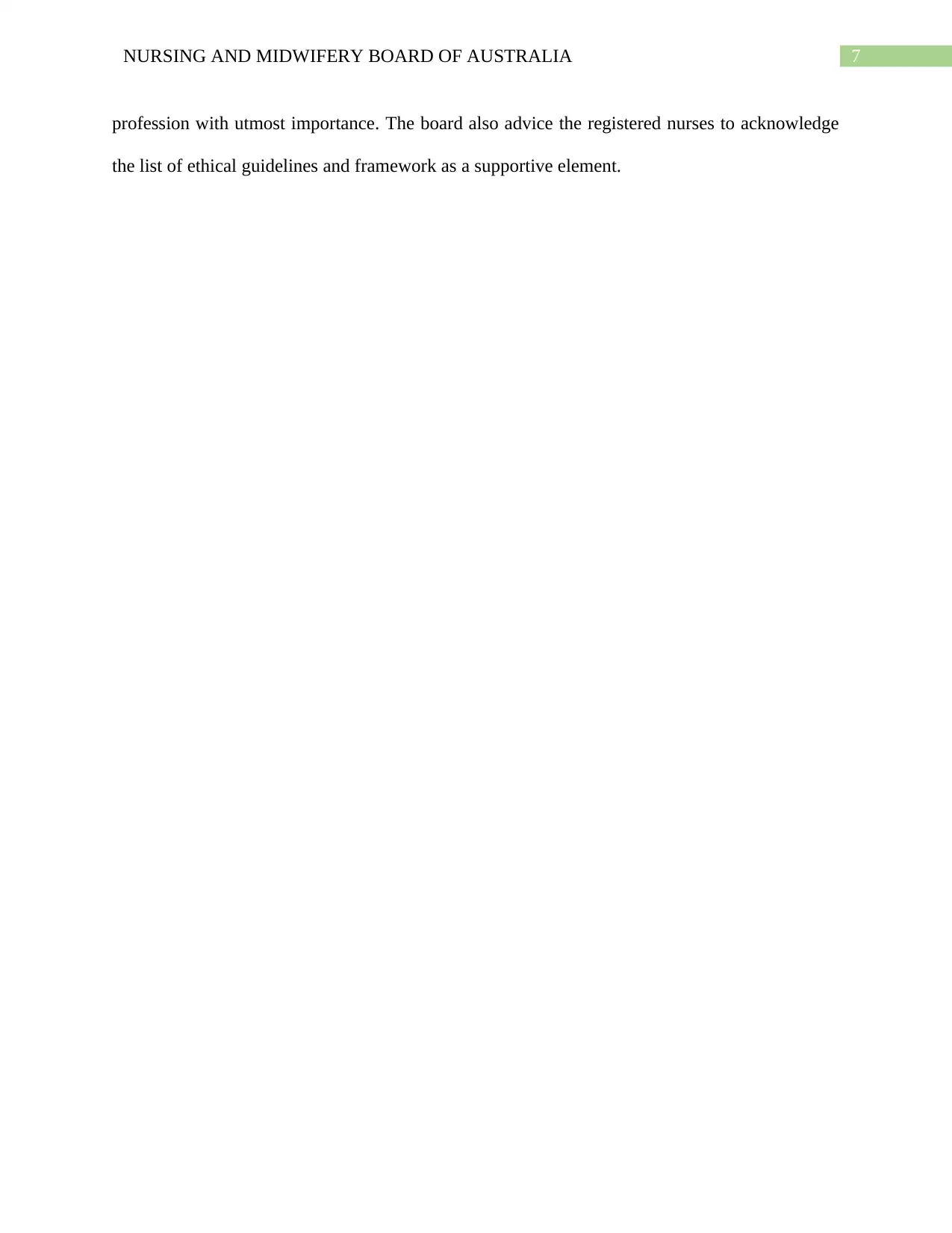
7NURSING AND MIDWIFERY BOARD OF AUSTRALIA
profession with utmost importance. The board also advice the registered nurses to acknowledge
the list of ethical guidelines and framework as a supportive element.
profession with utmost importance. The board also advice the registered nurses to acknowledge
the list of ethical guidelines and framework as a supportive element.
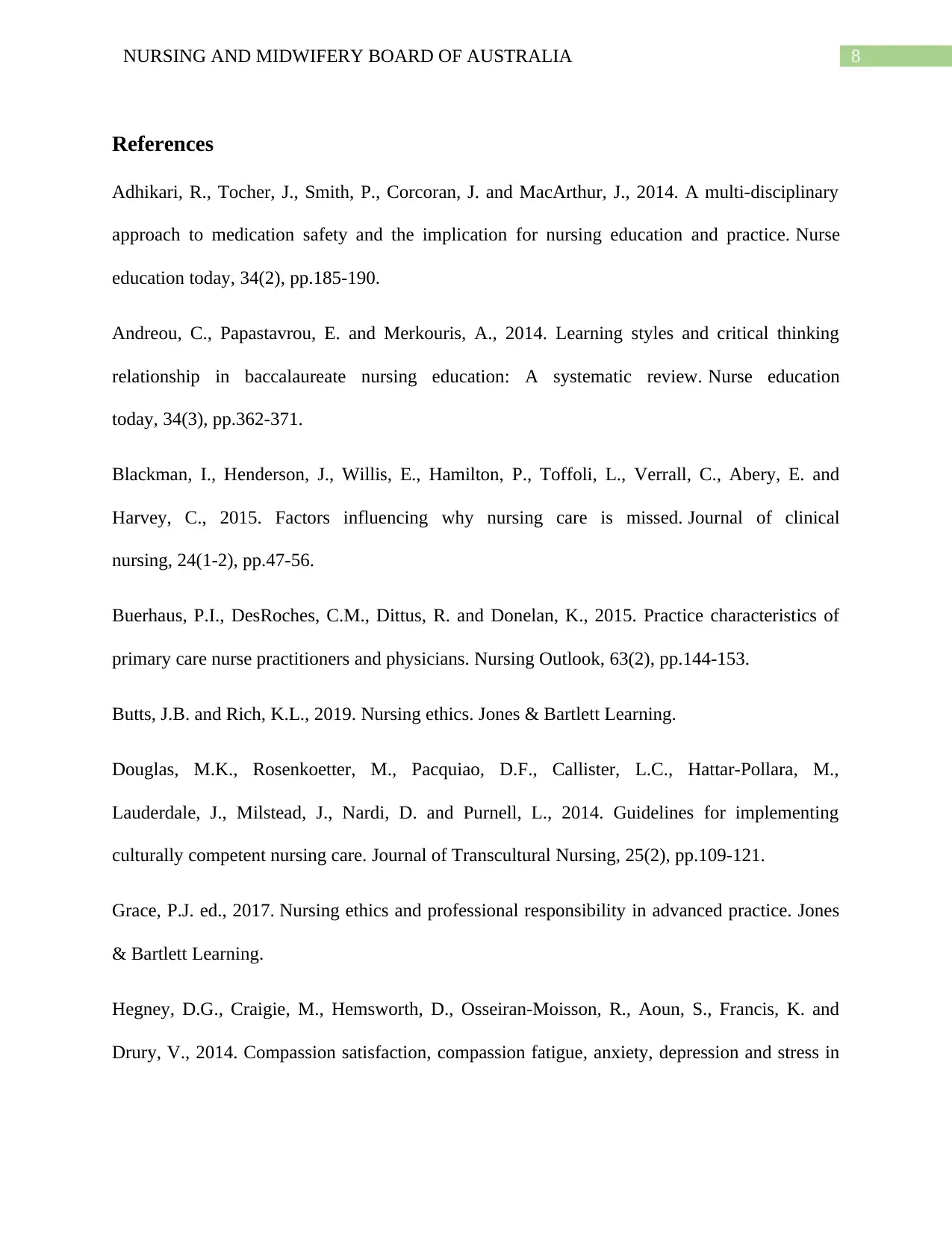
8NURSING AND MIDWIFERY BOARD OF AUSTRALIA
References
Adhikari, R., Tocher, J., Smith, P., Corcoran, J. and MacArthur, J., 2014. A multi-disciplinary
approach to medication safety and the implication for nursing education and practice. Nurse
education today, 34(2), pp.185-190.
Andreou, C., Papastavrou, E. and Merkouris, A., 2014. Learning styles and critical thinking
relationship in baccalaureate nursing education: A systematic review. Nurse education
today, 34(3), pp.362-371.
Blackman, I., Henderson, J., Willis, E., Hamilton, P., Toffoli, L., Verrall, C., Abery, E. and
Harvey, C., 2015. Factors influencing why nursing care is missed. Journal of clinical
nursing, 24(1-2), pp.47-56.
Buerhaus, P.I., DesRoches, C.M., Dittus, R. and Donelan, K., 2015. Practice characteristics of
primary care nurse practitioners and physicians. Nursing Outlook, 63(2), pp.144-153.
Butts, J.B. and Rich, K.L., 2019. Nursing ethics. Jones & Bartlett Learning.
Douglas, M.K., Rosenkoetter, M., Pacquiao, D.F., Callister, L.C., Hattar-Pollara, M.,
Lauderdale, J., Milstead, J., Nardi, D. and Purnell, L., 2014. Guidelines for implementing
culturally competent nursing care. Journal of Transcultural Nursing, 25(2), pp.109-121.
Grace, P.J. ed., 2017. Nursing ethics and professional responsibility in advanced practice. Jones
& Bartlett Learning.
Hegney, D.G., Craigie, M., Hemsworth, D., Osseiran‐Moisson, R., Aoun, S., Francis, K. and
Drury, V., 2014. Compassion satisfaction, compassion fatigue, anxiety, depression and stress in
References
Adhikari, R., Tocher, J., Smith, P., Corcoran, J. and MacArthur, J., 2014. A multi-disciplinary
approach to medication safety and the implication for nursing education and practice. Nurse
education today, 34(2), pp.185-190.
Andreou, C., Papastavrou, E. and Merkouris, A., 2014. Learning styles and critical thinking
relationship in baccalaureate nursing education: A systematic review. Nurse education
today, 34(3), pp.362-371.
Blackman, I., Henderson, J., Willis, E., Hamilton, P., Toffoli, L., Verrall, C., Abery, E. and
Harvey, C., 2015. Factors influencing why nursing care is missed. Journal of clinical
nursing, 24(1-2), pp.47-56.
Buerhaus, P.I., DesRoches, C.M., Dittus, R. and Donelan, K., 2015. Practice characteristics of
primary care nurse practitioners and physicians. Nursing Outlook, 63(2), pp.144-153.
Butts, J.B. and Rich, K.L., 2019. Nursing ethics. Jones & Bartlett Learning.
Douglas, M.K., Rosenkoetter, M., Pacquiao, D.F., Callister, L.C., Hattar-Pollara, M.,
Lauderdale, J., Milstead, J., Nardi, D. and Purnell, L., 2014. Guidelines for implementing
culturally competent nursing care. Journal of Transcultural Nursing, 25(2), pp.109-121.
Grace, P.J. ed., 2017. Nursing ethics and professional responsibility in advanced practice. Jones
& Bartlett Learning.
Hegney, D.G., Craigie, M., Hemsworth, D., Osseiran‐Moisson, R., Aoun, S., Francis, K. and
Drury, V., 2014. Compassion satisfaction, compassion fatigue, anxiety, depression and stress in
⊘ This is a preview!⊘
Do you want full access?
Subscribe today to unlock all pages.

Trusted by 1+ million students worldwide
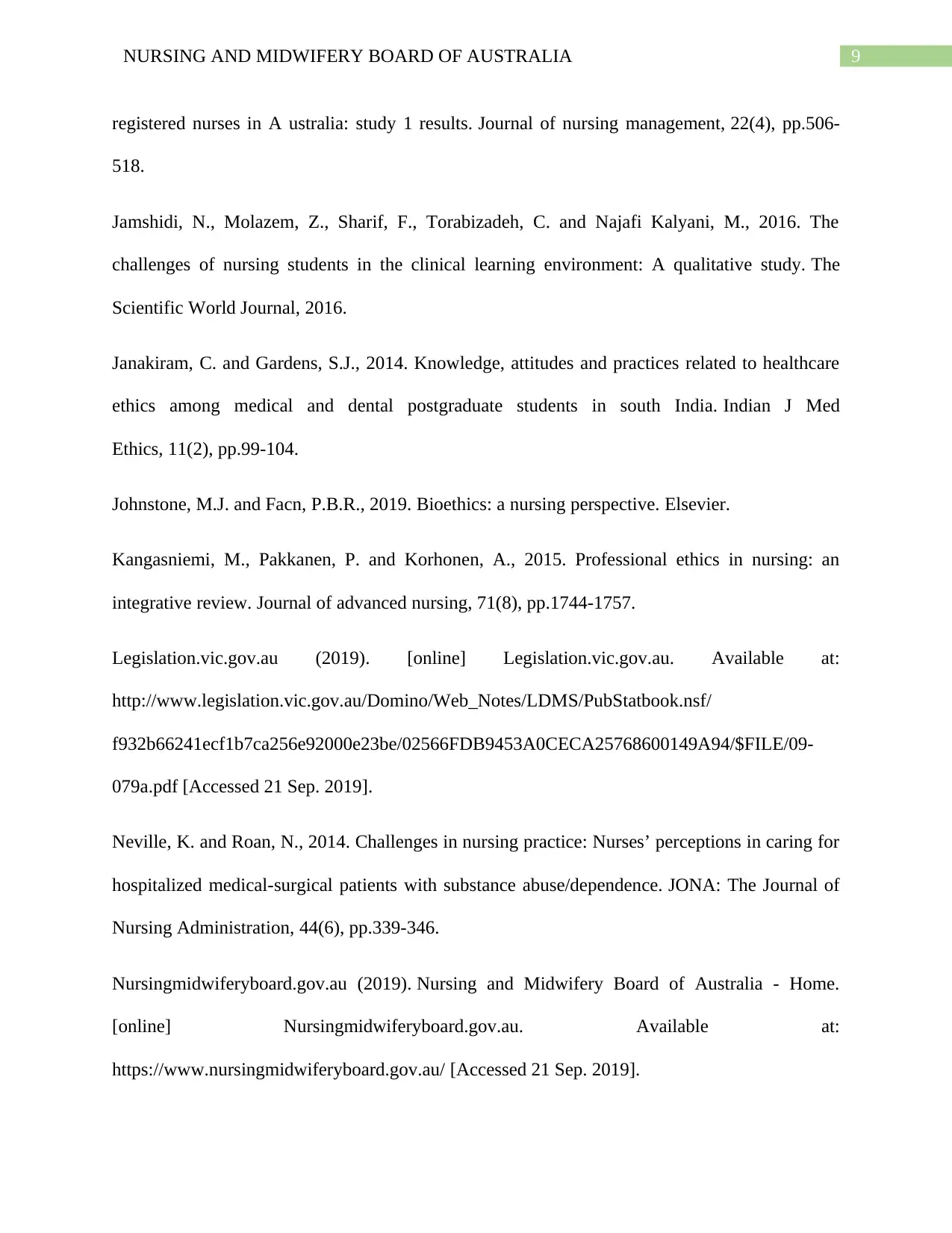
9NURSING AND MIDWIFERY BOARD OF AUSTRALIA
registered nurses in A ustralia: study 1 results. Journal of nursing management, 22(4), pp.506-
518.
Jamshidi, N., Molazem, Z., Sharif, F., Torabizadeh, C. and Najafi Kalyani, M., 2016. The
challenges of nursing students in the clinical learning environment: A qualitative study. The
Scientific World Journal, 2016.
Janakiram, C. and Gardens, S.J., 2014. Knowledge, attitudes and practices related to healthcare
ethics among medical and dental postgraduate students in south India. Indian J Med
Ethics, 11(2), pp.99-104.
Johnstone, M.J. and Facn, P.B.R., 2019. Bioethics: a nursing perspective. Elsevier.
Kangasniemi, M., Pakkanen, P. and Korhonen, A., 2015. Professional ethics in nursing: an
integrative review. Journal of advanced nursing, 71(8), pp.1744-1757.
Legislation.vic.gov.au (2019). [online] Legislation.vic.gov.au. Available at:
http://www.legislation.vic.gov.au/Domino/Web_Notes/LDMS/PubStatbook.nsf/
f932b66241ecf1b7ca256e92000e23be/02566FDB9453A0CECA25768600149A94/$FILE/09-
079a.pdf [Accessed 21 Sep. 2019].
Neville, K. and Roan, N., 2014. Challenges in nursing practice: Nurses’ perceptions in caring for
hospitalized medical-surgical patients with substance abuse/dependence. JONA: The Journal of
Nursing Administration, 44(6), pp.339-346.
Nursingmidwiferyboard.gov.au (2019). Nursing and Midwifery Board of Australia - Home.
[online] Nursingmidwiferyboard.gov.au. Available at:
https://www.nursingmidwiferyboard.gov.au/ [Accessed 21 Sep. 2019].
registered nurses in A ustralia: study 1 results. Journal of nursing management, 22(4), pp.506-
518.
Jamshidi, N., Molazem, Z., Sharif, F., Torabizadeh, C. and Najafi Kalyani, M., 2016. The
challenges of nursing students in the clinical learning environment: A qualitative study. The
Scientific World Journal, 2016.
Janakiram, C. and Gardens, S.J., 2014. Knowledge, attitudes and practices related to healthcare
ethics among medical and dental postgraduate students in south India. Indian J Med
Ethics, 11(2), pp.99-104.
Johnstone, M.J. and Facn, P.B.R., 2019. Bioethics: a nursing perspective. Elsevier.
Kangasniemi, M., Pakkanen, P. and Korhonen, A., 2015. Professional ethics in nursing: an
integrative review. Journal of advanced nursing, 71(8), pp.1744-1757.
Legislation.vic.gov.au (2019). [online] Legislation.vic.gov.au. Available at:
http://www.legislation.vic.gov.au/Domino/Web_Notes/LDMS/PubStatbook.nsf/
f932b66241ecf1b7ca256e92000e23be/02566FDB9453A0CECA25768600149A94/$FILE/09-
079a.pdf [Accessed 21 Sep. 2019].
Neville, K. and Roan, N., 2014. Challenges in nursing practice: Nurses’ perceptions in caring for
hospitalized medical-surgical patients with substance abuse/dependence. JONA: The Journal of
Nursing Administration, 44(6), pp.339-346.
Nursingmidwiferyboard.gov.au (2019). Nursing and Midwifery Board of Australia - Home.
[online] Nursingmidwiferyboard.gov.au. Available at:
https://www.nursingmidwiferyboard.gov.au/ [Accessed 21 Sep. 2019].
Paraphrase This Document
Need a fresh take? Get an instant paraphrase of this document with our AI Paraphraser
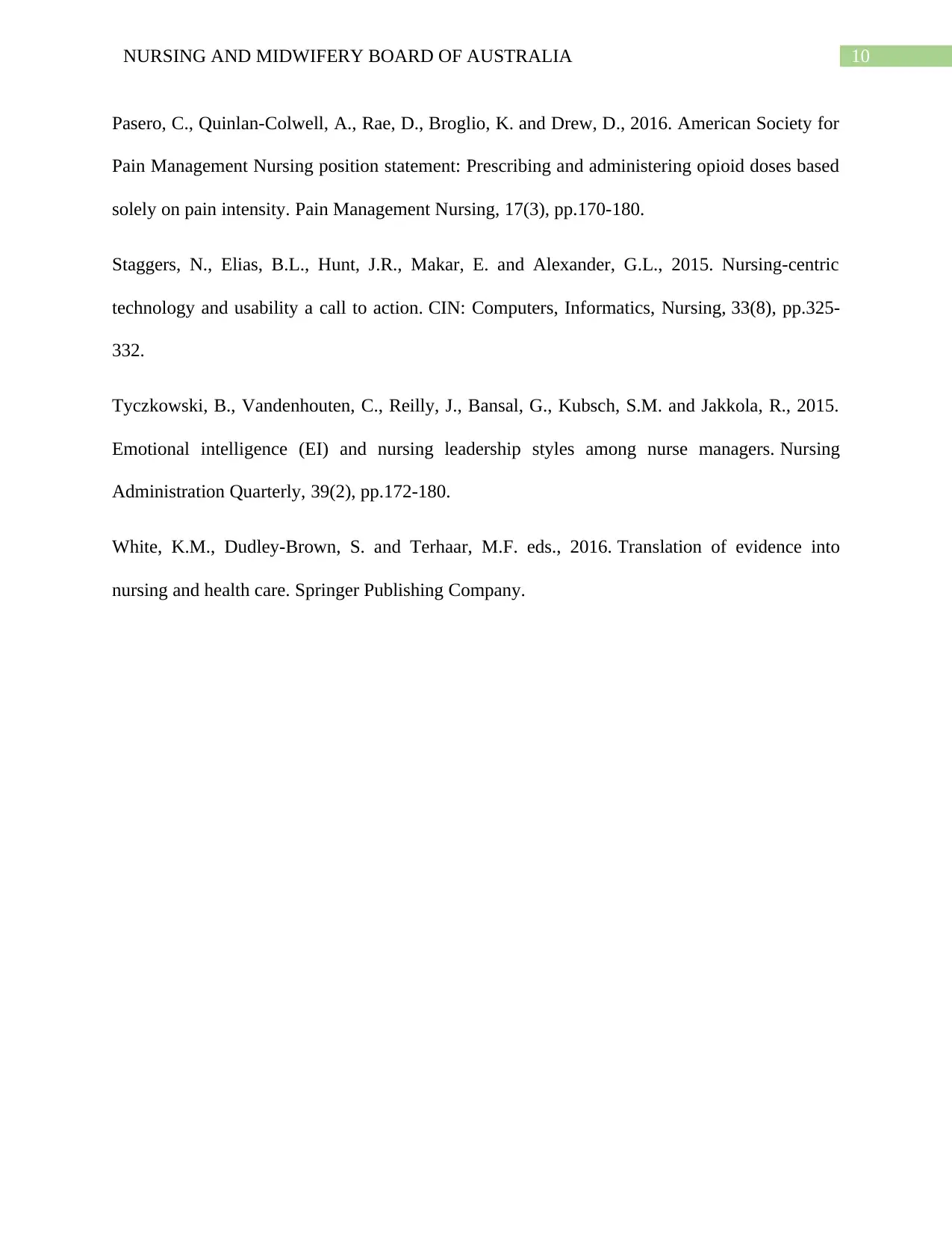
10NURSING AND MIDWIFERY BOARD OF AUSTRALIA
Pasero, C., Quinlan-Colwell, A., Rae, D., Broglio, K. and Drew, D., 2016. American Society for
Pain Management Nursing position statement: Prescribing and administering opioid doses based
solely on pain intensity. Pain Management Nursing, 17(3), pp.170-180.
Staggers, N., Elias, B.L., Hunt, J.R., Makar, E. and Alexander, G.L., 2015. Nursing-centric
technology and usability a call to action. CIN: Computers, Informatics, Nursing, 33(8), pp.325-
332.
Tyczkowski, B., Vandenhouten, C., Reilly, J., Bansal, G., Kubsch, S.M. and Jakkola, R., 2015.
Emotional intelligence (EI) and nursing leadership styles among nurse managers. Nursing
Administration Quarterly, 39(2), pp.172-180.
White, K.M., Dudley-Brown, S. and Terhaar, M.F. eds., 2016. Translation of evidence into
nursing and health care. Springer Publishing Company.
Pasero, C., Quinlan-Colwell, A., Rae, D., Broglio, K. and Drew, D., 2016. American Society for
Pain Management Nursing position statement: Prescribing and administering opioid doses based
solely on pain intensity. Pain Management Nursing, 17(3), pp.170-180.
Staggers, N., Elias, B.L., Hunt, J.R., Makar, E. and Alexander, G.L., 2015. Nursing-centric
technology and usability a call to action. CIN: Computers, Informatics, Nursing, 33(8), pp.325-
332.
Tyczkowski, B., Vandenhouten, C., Reilly, J., Bansal, G., Kubsch, S.M. and Jakkola, R., 2015.
Emotional intelligence (EI) and nursing leadership styles among nurse managers. Nursing
Administration Quarterly, 39(2), pp.172-180.
White, K.M., Dudley-Brown, S. and Terhaar, M.F. eds., 2016. Translation of evidence into
nursing and health care. Springer Publishing Company.
1 out of 11
Related Documents
Your All-in-One AI-Powered Toolkit for Academic Success.
+13062052269
info@desklib.com
Available 24*7 on WhatsApp / Email
![[object Object]](/_next/static/media/star-bottom.7253800d.svg)
Unlock your academic potential
Copyright © 2020–2026 A2Z Services. All Rights Reserved. Developed and managed by ZUCOL.





